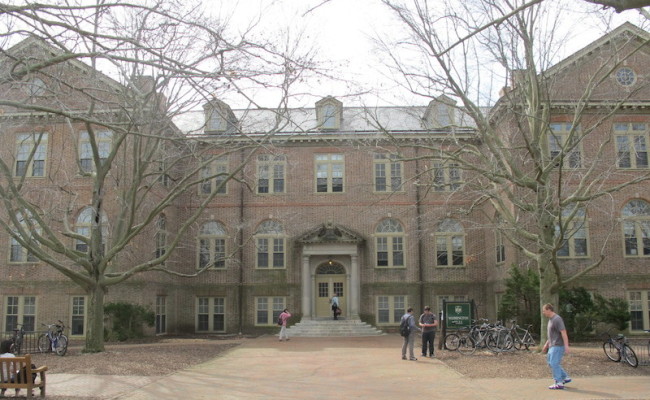According to a 2010 national survey on drug use and health, approximately 22 million Americans, almost nine percent of the population, use illegal narcotics. March 15, Mark Osler ’85, a former federal prosecutor now working to change drug laws in American courts, gave a lecture about the billion-dollar drug industry in the United States.
Hosted by the College Libertarians and the College of William and Mary’s chapter of the NAACP, “Incarceration Nation: A Criminal Justice Reform Speaker Series” focuses on discussing issues in the U.S. Criminal Justice System such as the death penalty and sentencing inequalities. As one of the first times the two clubs have worked together, TyDazia Talley ’17, a member of the NAACP, said she was excited to forge a partnership between her organization and the College Libertarians.
“I was really interested because I don’t know a lot about the Libertarian Party so any time I can get involved in knowing more about politics that’s really great for me,” Talley said. “The fact that these libertarians and some of these conservative people who you would think wouldn’t have some of the same ideals as the NAACP, it’s really interesting and I feel like more people should know about it.”
College Libertarians President Skip Estes ’17 said he got the inspiration for the event while participating in a debate hosted by the NACCP. He met the first speaker, Osler, at an alumni event in Washington, D.C. this past October.
“Maybe we should talk about these issues a little bit more,” Estes said. “And the first person that came to mind was professor Mark Osler. I met him at an alumni event in D.C. in October and he spoke on issues related to criminal justice reform and its effects on minority communities in the United States.”
Before becoming a professor at the University of St. Thomas School of Law, Osler was a federal prosecutor in Detroit where he worked on small-time crack cocaine cases. He began the lecture by discussing the Anti-Drug Abuse Act enacted in the 1980s which requires a five-year minimum sentence for anyone caught with over five grams of crack or 500 grams of powdered cocaine.
Osler’s work on drug law reform began after he sentenced an 18-year-old African-American boy, a first-time offender who was caught after he sold a total of five grams of crack to an undercover officer and was found with a gun hidden in his couch, to ten years in prison. He said that the minimum sentencing laws are often considered flawed because they do not take into account an offender’s prior history with the law.
“He went to prison for ten years,” Osler said. “We don’t have parole in the federal system, so that was that. That was wrong. And I’ve spent the last 20 years of my career working on the problem of narcotics and thinking about it and I started out on the side of prosecuting — being the person that stands in front of the judge and sends people away.”
Osler described the American desire for drugs as a “cultural craving.” In the U.S., the drug industry was worth almost $100 billion in 2013, which was about $98 billion more than box office revenues that same year. Osler described the desire for drugs as being a demand market following the same rules of supply and demand, like any other commodity. So, he said that increasing the price of narcotics will decrease demand.
“The desire for drugs is demand and narcotics are a market and they respond to the rules that any market does,” Osler said. “And there’s a couple things that this makes untrue. One is the idea that if you have a war on drugs, you can win that war … it’s not a reasonable goal. You don’t get rid of an entire market so long as there is demand — and there’s incredible demand in this country. Another tough reality that comes from this second rule is that … the most that we can do is incrementally increase the price on the street.”
Another solution Osler proposed for ending the drug problem is creating opportunities for entrepreneurship by deregulating markets. In many places, restrictions on business prevent people from becoming business owners. He said that in his hometown of Detroit, to own a food truck, you have to make the food in a commercial grade kitchen, then sell it from within the truck.
“From the people I’ve seen who sold drugs, what they are is entrepreneurs,” Osler said. “They want to create something; they want to engage in a market. And so, if we want to get rid of the structures that create people who are left to sell drugs — maybe creating more employment would pick up some of those people and give them more opportunities — but so would giving them the opportunity to be an entrepreneur in a market place other than narcotics.”
Osler outlined in his lecture his recommendations for an alternative “war on drugs” that involves legalizing certain recreational narcotics and later regulating the market as the government currently does with alcohol. Osler ended his lecture by encouraging attendees to continue fighting for what they believe in, even if they believe that they’re not being heard.
“Hopefully you have an idea of how you want to change the world, you know what you want to do, what you want to convince people of … sometimes when you do that, you feel like you’re making futile speeches, like no one’s actually listening to you, you’re not changing anyone’s mind,” Osler said. “When you’re passionate about what it is you want to change, you don’t get feedback from who you affect all the time. You have to be satisfied with putting ripples in the pond and hoping that they go someplace.”

